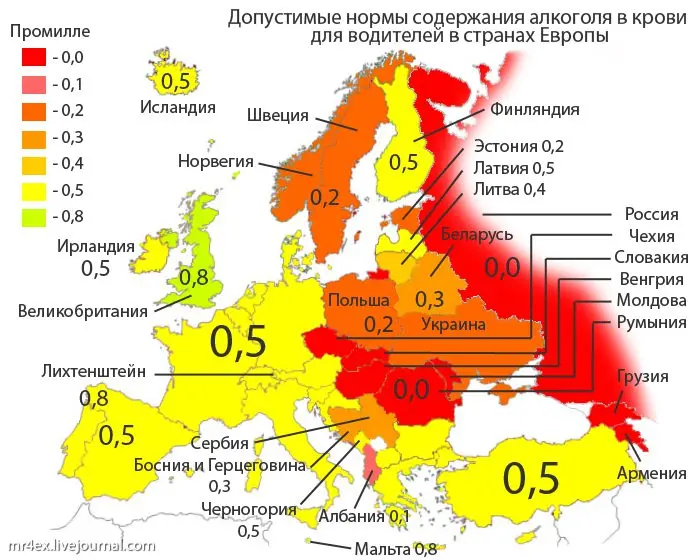The degree of intoxication is determined by the percentage of alcohol contained in the blood. Theoretically, for a sober person, this indicator should be zero. But in practice, due to the error of measuring instruments (alcotesters) and the use of certain drugs, even a person who has not drunk alcohol can be recognized as drunk. To avoid such incidents, the legislation of most countries introduced a non-zero allowable alcohol limit.
For drivers, exceeding this indicator threatens with large fines and even deprivation of rights. At first, in Russia, a person was recognized as sober if the concentration of alcohol in his blood did not exceed 0,3 ppm. But then this rule was canceled, referring to the national mentality of Russians who do not know how to drink.
After several years of applying the zero alcohol norm, it became clear that this rule does not take into account many nuances, making even those drivers who do not drink alcohol at all violators. The problem is in the errors of breathalyzers and taking medicines (including for colds) containing a small amount of alcohol, which drivers might not know about. The law has changed again.
Current alcohol limit
As of 2017, according to Article 12.8 of the Code of Administrative Offenses of the Russian Federation, liability for drunk driving: “occurs in the event of the established fact of the use of substances that cause alcohol intoxication, which is determined by the presence of absolute ethyl alcohol in a concentration exceeding the possible total measurement error, namely 0,16 milligram per liter of exhaled air. This amount approximately corresponds to 0,3 ppm (0,3 g of alcohol per 1 liter of blood).
In Ukraine, the maximum blood alcohol level is 0,2 ppm. Violations are punishable by fines, loss of a driver’s license, and even corrective labor.

Interestingly, for a healthy person, a dose of more than 4,0 ppm is considered fatal. Smaller concentrations are usually not fatal, but significantly affect the functioning of the body, causing a hangover in the morning.
The rate at which alcohol is absorbed varies from person to person. It depends on the characteristics of the body, the type and strength of the drink, snacks, air temperature and other factors. Predicting how quickly drunkenness will come is almost impossible.









